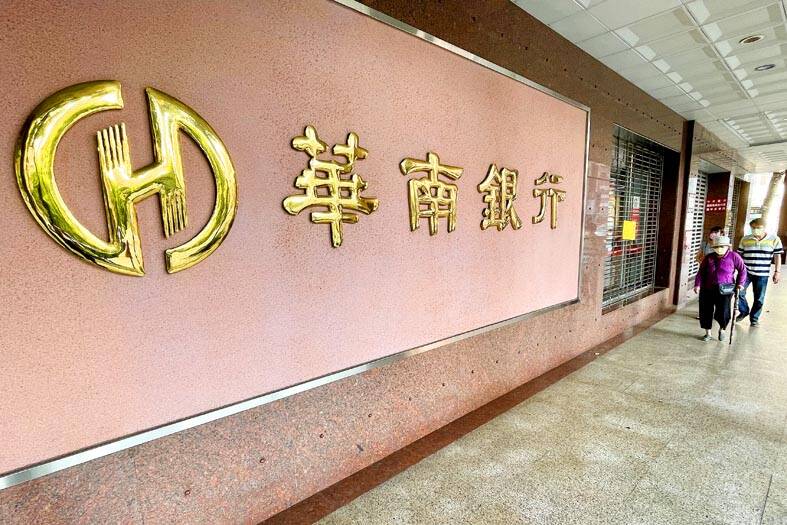State-run Hua Nan Financial Holding Co (華南金控) yesterday said that it is seeking to raise fee income by 10 percent this year, but would cautiously pursue loan growth as borrowing costs remain high amid uncertainty.
“We are looking for stable earnings this year in light of ongoing geopolitical tensions and fluid economic scenes at home and overseas,” Hua Nan Financial president Robert Li (李耀卿) told an investors’ conference in Taipei.
The bank-focused conglomerate’s net income last year rose 24.9 percent year-on-year to NT$21.62 billion (US$678.42 million), or earnings per share of NT$1.58.

Photo: George Tsorng, Taipei Times
Li attributed the extraordinary showing to hefty gains from financial product trading and investment at its main subsidiary Hua Nan Commercial Bank (華南銀行), which generated NT$20.05 billion in net income last year, up 20 percent year-on-year and accounting for 89 percent of the firm’s profit.
The lender’s outstanding loans last year grew 10 percent from a year earlier, but interest income dropped 15.1 percent, company data showed.
Li did not mention concrete loan-growth targets for this year, saying the firm prefers to maintain a cautious outlook for the sake of risk control.
Foreign exchange swaps drove NT$10 billion of profit last year, but that might slow down once the US Federal Reserve lowers interest rates, mitigating the interest rate gap between Taiwan and the US, Li said.
Restrictive monetary policy is favorable for interest income and swap operations while raising funding costs and curtailing loan demand, he said, adding that high interest rates benefit financial institutions with many US dollar-denominated assets.
On the other hand, interest rate cuts by the Fed would ease funding costs while raising the value of US dollar debt, the company said.
It added that a 70 percent of its debt position bears fixed interest income, a benefit that does not apply to bonds with floating rates.
Despite shrinking interest income, Hua Nan Bank enjoyed 15.9 percent growth in fee income last year, supported by a 19.2 percent advance in wealth management and a 14.3 percent increase in fund sales, company data showed.
Growth momentum in fee income is expected to continue this year at 10 percent, as demand for wealth management and fund products gains speed, it said.
Hua Nan Bank is expecting to reap a windfall from being the custodian bank of the two new hit exchange-traded funds (ETFs) — UPAMC Taiwan High Dividend Momentum ETF and Yuanta Taiwan Value High Dividend ETF.
The boom in ETFs featuring quarterly or monthly distributions of cash dividends has to do with Taiwan’s aging society, as such products promise better cash flow than time deposits and insurance policies, the firm said.
However, investors should be braced for volatility in their ETF portfolios, it said.

South Korea’s equity benchmark yesterday crossed a new milestone just a month after surpassing the once-unthinkable 5,000 mark as surging global memory demand powers the country’s biggest chipmakers. The KOSPI advanced as much as 2.6 percent to a record 6,123, with Samsung Electronics Co and SK Hynix Inc each gaining more than 2 percent. With the benchmark now up 45 percent this year, South Korea’s stock market capitalization has also moved past France’s, following last month’s overtaking of Germany’s. Long overlooked by foreign funds, despite being undervalued, South Korean stocks have now emerged as clear winners in the global market. The so-called “artificial intelligence

NEW IDENTITY: Known for its software, India has expanded into hardware, with its semiconductor industry growing from US$38bn in 2023 to US$45bn to US$50bn India on Saturday inaugurated its first semiconductor assembly and test facility, a milestone in the government’s push to reduce dependence on foreign chipmakers and stake a claim in a sector dominated by China. Indian Prime Minister Narendra Modi opened US firm Micron Technology Inc’s semiconductor assembly, test and packaging unit in his home state of Gujarat, hailing the “dawn of a new era” for India’s technology ambitions. “When young Indians look back in the future, they will see this decade as the turning point in our tech future,” Modi told the event, which was broadcast on his YouTube channel. The plant would convert

‘SEISMIC SHIFT’: The researcher forecast there would be about 1.1 billion mobile shipments this year, down from 1.26 billion the prior year and erasing years of gains The global smartphone market is expected to contract 12.9 percent this year due to the unprecedented memorychip shortage, marking “a crisis like no other,” researcher International Data Corp (IDC) said. The new forecast, a dramatic revision down from earlier estimates, gives the latest accounting of the ongoing memory crunch that is affecting every corner of the electronics industry. The demand for advanced memory to power artificial intelligence (AI) tasks has drained global supply until well into next year and jeopardizes the business model of many smartphone makers. IDC forecast about 1.1 billion mobile shipments this year, down from 1.26 billion the prior

People stand in a Pokemon store in Tokyo on Thursday. One of the world highest-grossing franchises is celebrated its 30th anniversary yesterday.